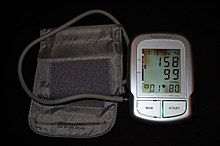| Hypertensive heart disease | |
|---|---|
 | |
| Automated arm blood pressure meter showing arterial hypertension (shown a systolic blood pressure 158 mmHg, diastolic blood pressure 99 mmHg and heart rate of 80 beats per minute) | |
| Specialty | Cardiology |
Hypertensive heart disease includes a number of complications of high blood pressure that affect the heart. While there are several definitions of hypertensive heart disease in the medical literature,[1][2][3] the term is most widely used in the context of the International Classification of Diseases (ICD) coding categories. The definition includes heart failure and other cardiac complications of hypertension when a causal relationship between the heart disease and hypertension is stated or implied on the death certificate. In 2013 hypertensive heart disease resulted in 1.07 million deaths as compared with 630,000 deaths in 1990.[4]
According to ICD-10, hypertensive heart disease (I11), and its subcategories: hypertensive heart disease with heart failure (I11.0) and hypertensive heart disease without heart failure (I11.9) are distinguished from chronic rheumatic heart diseases (I05-I09), other forms of heart disease (I30-I52) and ischemic heart diseases (I20-I25). However, since high blood pressure is a risk factor for atherosclerosis and ischemic heart disease,[5] death rates from hypertensive heart disease provide an incomplete measure of the burden of disease due to high blood pressure.
- ^ Alegría-Ezquerra E, González-Juanatey JR, González-Maqueda I (April 2006). "Hypertensive heart disease: a proposed clinical classification". Revista Española de Cardiología (in Spanish). 59 (4): 398–9. doi:10.1016/S1885-5857(06)60781-0. PMID 16709396. S2CID 29897347.
- ^ Lip GY, Felmeden DC, Li-Saw-Hee FL, Beevers DG (October 2000). "Hypertensive heart disease. A complex syndrome or a hypertensive 'cardiomyopathy'?". European Heart Journal. 21 (20): 1653–65. doi:10.1053/euhj.2000.2339. PMID 11032692.
- ^ Gonzalez-Maqueda, I; Alegria-Ezquerra, Eduardo; Gonzalez-Juanatey, Jose Ramon; Working group of the Spanish Society of Cardiology (2009). "Hypertensive heart disease: a new clinical classification (VIA)". e-Journal of the European Society of Cardiology Council for Cardiology Practice. 7 (20): ePub.
- ^ "Global, regional, and national age-sex specific all-cause and cause-specific mortality for 240 causes of death, 1990-2013: a systematic analysis for the Global Burden of Disease Study 2013". Lancet. 385 (9963): 117–71. 17 December 2014. doi:10.1016/S0140-6736(14)61682-2. PMC 4340604. PMID 25530442.
- ^ Grossman E, Messerli FH (August 1996). "Diabetic and hypertensive heart disease". Annals of Internal Medicine. 125 (4): 304–310. doi:10.7326/0003-4819-125-4-199608150-00009. PMID 8678395. S2CID 38947800.